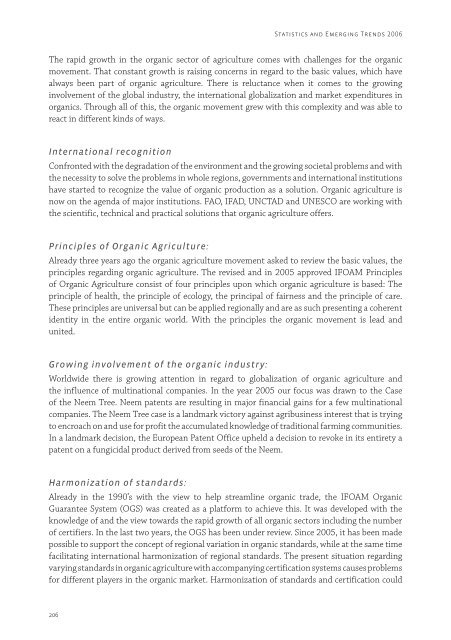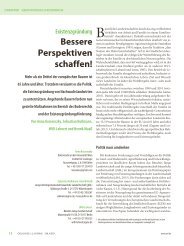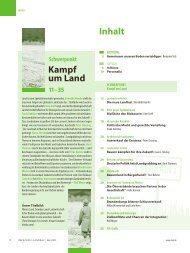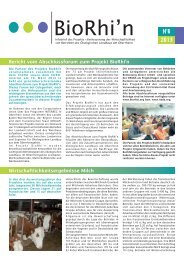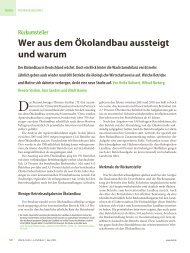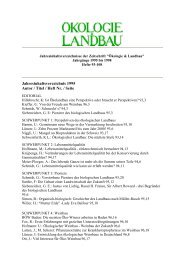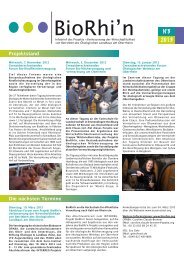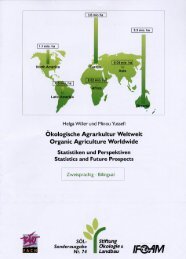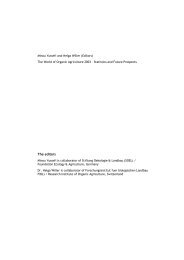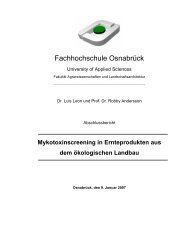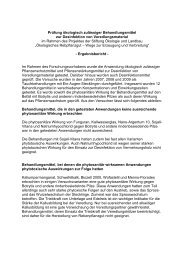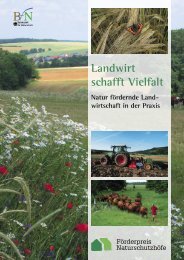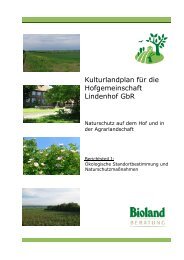the world of organic agriculture - Organic Eprints
the world of organic agriculture - Organic Eprints
the world of organic agriculture - Organic Eprints
You also want an ePaper? Increase the reach of your titles
YUMPU automatically turns print PDFs into web optimized ePapers that Google loves.
206<br />
Statistics and Emerging Trends 2006<br />
The rapid growth in <strong>the</strong> <strong>organic</strong> sector <strong>of</strong> <strong>agriculture</strong> comes with challenges for <strong>the</strong> <strong>organic</strong><br />
movement. That constant growth is raising concerns in regard to <strong>the</strong> basic values, which have<br />
always been part <strong>of</strong> <strong>organic</strong> <strong>agriculture</strong>. There is reluctance when it comes to <strong>the</strong> growing<br />
involvement <strong>of</strong> <strong>the</strong> global industry, <strong>the</strong> international globalization and market expenditures in<br />
<strong>organic</strong>s. Through all <strong>of</strong> this, <strong>the</strong> <strong>organic</strong> movement grew with this complexity and was able to<br />
react in different kinds <strong>of</strong> ways.<br />
International recognition<br />
Confronted with <strong>the</strong> degradation <strong>of</strong> <strong>the</strong> environment and <strong>the</strong> growing societal problems and with<br />
<strong>the</strong> necessity to solve <strong>the</strong> problems in whole regions, governments and international institutions<br />
have started to recognize <strong>the</strong> value <strong>of</strong> <strong>organic</strong> production as a solution. <strong>Organic</strong> <strong>agriculture</strong> is<br />
now on <strong>the</strong> agenda <strong>of</strong> major institutions. FAO, IFAD, UNCTAD and UNESCO are working with<br />
<strong>the</strong> scientific, technical and practical solutions that <strong>organic</strong> <strong>agriculture</strong> <strong>of</strong>fers.<br />
Principles <strong>of</strong> <strong>Organic</strong> Agriculture:<br />
Already three years ago <strong>the</strong> <strong>organic</strong> <strong>agriculture</strong> movement asked to review <strong>the</strong> basic values, <strong>the</strong><br />
principles regarding <strong>organic</strong> <strong>agriculture</strong>. The revised and in 2005 approved IFOAM Principles<br />
<strong>of</strong> <strong>Organic</strong> Agriculture consist <strong>of</strong> four principles upon which <strong>organic</strong> <strong>agriculture</strong> is based: The<br />
principle <strong>of</strong> health, <strong>the</strong> principle <strong>of</strong> ecology, <strong>the</strong> principal <strong>of</strong> fairness and <strong>the</strong> principle <strong>of</strong> care.<br />
These principles are universal but can be applied regionally and are as such presenting a coherent<br />
identity in <strong>the</strong> entire <strong>organic</strong> <strong>world</strong>. With <strong>the</strong> principles <strong>the</strong> <strong>organic</strong> movement is lead and<br />
united.<br />
Growing involvement <strong>of</strong> <strong>the</strong> <strong>organic</strong> industry:<br />
Worldwide <strong>the</strong>re is growing attention in regard to globalization <strong>of</strong> <strong>organic</strong> <strong>agriculture</strong> and<br />
<strong>the</strong> influence <strong>of</strong> multinational companies. In <strong>the</strong> year 2005 our focus was drawn to <strong>the</strong> Case<br />
<strong>of</strong> <strong>the</strong> Neem Tree. Neem patents are resulting in major financial gains for a few multinational<br />
companies. The Neem Tree case is a landmark victory against agribusiness interest that is trying<br />
to encroach on and use for pr<strong>of</strong>it <strong>the</strong> accumulated knowledge <strong>of</strong> traditional farming communities.<br />
In a landmark decision, <strong>the</strong> European Patent Office upheld a decision to revoke in its entirety a<br />
patent on a fungicidal product derived from seeds <strong>of</strong> <strong>the</strong> Neem.<br />
Harmonization <strong>of</strong> standards:<br />
Already in <strong>the</strong> 1990’s with <strong>the</strong> view to help streamline <strong>organic</strong> trade, <strong>the</strong> IFOAM <strong>Organic</strong><br />
Guarantee System (OGS) was created as a platform to achieve this. It was developed with <strong>the</strong><br />
knowledge <strong>of</strong> and <strong>the</strong> view towards <strong>the</strong> rapid growth <strong>of</strong> all <strong>organic</strong> sectors including <strong>the</strong> number<br />
<strong>of</strong> certifiers. In <strong>the</strong> last two years, <strong>the</strong> OGS has been under review. Since 2005, it has been made<br />
possible to support <strong>the</strong> concept <strong>of</strong> regional variation in <strong>organic</strong> standards, while at <strong>the</strong> same time<br />
facilitating international harmonization <strong>of</strong> regional standards. The present situation regarding<br />
varying standards in <strong>organic</strong> <strong>agriculture</strong> with accompanying certification systems causes problems<br />
for different players in <strong>the</strong> <strong>organic</strong> market. Harmonization <strong>of</strong> standards and certification could


